Any links on this page that lead to products on Amazon and other companies may be affiliate links and we earn a commission if you make a qualifying purchase. Thanks in advance for your support!
A regular question posed is “Which are the foods for acid reflux?” This article takes a look at those foods which have been shown to help with gerd, and also those which more often than not are considered acid reflux “triggers”. So, which are the foods for acid reflux?
Foods which help some acid reflux sufferers avoid or calm heartburn include Apples, Apple Cider Vinegar, Cabbage Juice, Peppers, Papaya, Fennel, and Ginger.
For more detail, read on below….
Night time reflux? Read how to avoid it here
Foods for Acid Reflux
There are a number of foods which, either through evidence based testing, or reputation, are known for their properties in easing reflux. It should be emphasised’ however, that not everybody feels the benefit of these foods; if that’s the case with you, be careful to continue with your reflux medication to tackle the symptoms.
Apples
Try a red apple as soon as you feel the burning sensation – this seems to work for a number of people to calm the sensation, though there seems to be no evidence as to why this is, nor why it should be confined to red apples. One possibility is that apples are naturally high in the acid-blocking plant-fiber pectin, a soluble fibre that can swell in your stomach and help to keep you feeling full. While the skins of apples can be harder to digest, cooking them softens the tough outer skin. Sprinkle baking apples with cinnamon and bake in a moderate oven for an hour.
Apple Cider Vinegar
Fight fire with fire – this may sound strange but apple cider vinegar is a centuries old panacea for many ills, including acid reflux / heartburn. For some people apple cider vinegar, taken as a couple of tablespoons in a large glass of water, provides almost instant relief from acid reflux. But for others (including me) it just adds to the discomfort. here’s one testimonial from the internet:
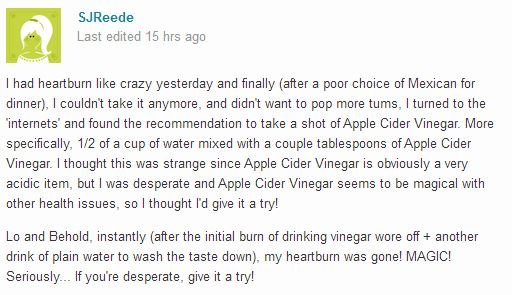
The mechanism by which it quells acid reflux is not clear. It is thought that the acetic acid in the vinegar helps to supplement low stomach acid in some individuals, thereby making the valve at the top of the stomach work more effectively and also enabling a more efficient digestion of food. Never take it undiluted, as it could burn you! Drink diluted apple cider vinegar through a straw (to minimise contact with the teeth, as it can soften the enamel a little) and avoid brushing your teeth for 1/2 hour after drinking. If you feel uncomfortable burning at any stage, stop using it. Also it may interfere with some medications, such as diuretics, heart disease medications, and diabetes drugs. Consult your doctor if you ae in any doubt. For more on apple cider vinegar and reflux, go here.
Night time reflux? Read how to avoid it here
Cabbage Juice
Cabbage, and especially the juice, is widely quoted as one of he foods for acid reflux. There are also products that contain cabbage juice extract in the form of Vitamin U called Gastramet (UK) (US) and Gastrazyme (US).
Vitamin U regulates acid and digestive enzyme production in the stomach.
Another property of vitamin U makes it an important aid for people afflicted with acid reflux – it can help regenerate mucous membrane such as the lining of the esophagus, which can be damaged by acid reflux.
Peppers

This is certainly not usually considered one of the foods for acid reflux. Peppers are more often on the list of foods to avoid, so it may be surprising to see it here.
However, there is evidence, both anecdotal and formal which suggests for some people hot peppers actually alleviate heartburn and acid reflux.
The reason for this lies in the capsaicin (the hot stuff in jalapeno peppers) which may protect the stomach lining (Journal of Physiology, Paris, Jan-Dec, 2001).
Also, regular use appears to decrease reflux symptoms (Journal of Neurogastroenterology and Motility, April, 2010), possibly because regular use of capsaicin can reduce pain, by depleting the chemical that transmits pain.
A small randomised study published in 2010 found that long term consumption of chili improved functional dyspepsia and GERD (gastroesophageal reflux disease) symptoms, ref 2 below.
Here’s one supporter of the use of peppers to alleviate the discomfort of acid reflux from http://www.peoplespharmacy.com :
“I was on reflux drugs like omeprazole (PPIs) for over ten years and even had surgery for severe reflux. ..
Feeling discouraged, I ate some jalapeno-topped snacks even though my doctor had warned me to avoid anything hot. My reflux is now kept in check by jalapenos every few days without needing anything else! The reflux pain only returns if I go a week without eating any jalapenos.
I have been PPI-free for over 18 months now and feel so much better. Why would jalapenos make such a difference so quickly? The pain eases within an hour of eating them and lasts for several days.”
Papaya
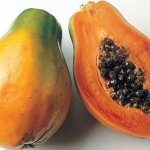
Papaya has been used for a very long time for a wide variety of conditions, including intestinal issues, stomach problems and heartburn, due to its anti-inflammatory properties.
One of the key ingredients is papain, a digestive enzyme which breaks down hard to digest protein, as well as carbohydrates and wheat gluton.
There is some anecdotal evidence that papaya is effective against acid reflux in some people:
“I’ve had the worst heartburn for months now, like the kind that keeps you up all night till you drag yourself to sleep in the recliner. Anyway a friend recently told me about papaya and it’s been working! I’ve just been snacking on dried papya several times a day (along with not drinking water close to bed time) and I’ve been doing great. So just wanted to share in case anyone else was having that kind that there’s not enough tums in the world for. http://forums.thebump.com/discussion/12621440/heartburn-relief
Take fresh papaya with or after meals. It’s also available in tablet form, here.
Whilst papaya is widely taken in all its forms and considered very safe, you would be advised to check with your health professional before taking papaya if you are pregnant, or have a pre-existing ulcer.
Fennel
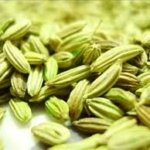
Fennel seed has been revered for centuries in folk medicine for its ability to calm the digestive system. Its active ingredient, anethole, has antimicrobial properties that can impede or even kill harmful bacteria, yeast and fungi, as well as slow the growth of cancer tumors in small trials.
Anecdotally, fennel could be regarded as one of the foods for acid reflux.
One experience:
“Several years ago, a reader wrote about her success getting off the medicine by taking fennel seeds. I had the same problem and tried the fennel seeds.
I also was able to come off PPIs. For the past three years, I’ve been drug-free, with only occasional mild heartburn symptoms. I hope you will continue to recommend this to readers who don’t know how to stop esomeprazole and similar medicines.”
Fennel seed, like cinnamon, has a naturally sweet flavour that works well in a wide variety of uses as a topping for roast chicken or pork, added to cooked vegetables or tossed into olive oil-based dressings in place of vinegar or citrus. Or try fennel tea, here.
Ginger
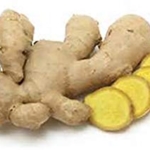
Ginger contains the active ingredient gingerol that works as an anti-nausea and anti-spasmotic, which may have some effect on the lower esophageal sphincter (the valve at the top of the stomach) to tighten, stopping the flow of acid. Ginger is a powerful anti-inflammatory and antibacterial root. One study (ref 3. below) found that participants taking ginger supplements had reduced inflammation markers within one month. Another study (ref 4 below) assessed the effect of ginger powder supplementation on Helicobacter pylori eradication and improvement of dyspeptic symptoms in patients with H. pylori.( H.Pylori, a bacterium which lives in our gut and sometimes causes ulcers, is often associated with acid reflux symptoms). This concluded that ginger can be considered as a useful complementary therapy. Anecdotal stories also suggest ginger has a positive effect in controlling acid reflux symptoms. Add it to soups, stir-fried veggies, rice or quinoa dishes by removing the peel with a vegetable peeler and starting with 1 tablespoon minced. Cook in a healthy oil (like olive, safflower or coconut), then add vegetables or add it to boiling water for a refreshing tea. Recommended loose leaf, caffeine free Tea can be found here. Or try a ginger supplement, here. Which foods do you find helpful in controlling your acid reflux symptoms? Please share these in the comments below.Refs: 1, 2. 3.
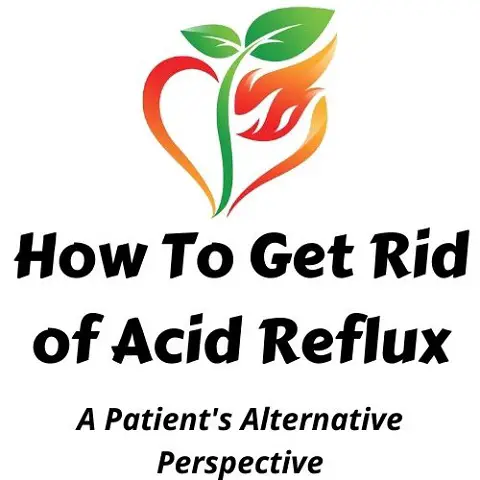
Leave a Reply